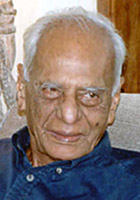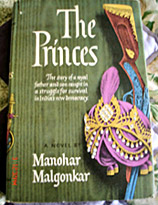 Manohar Malagaonkar is one of those Indian writers who writes in English and also gained international acclaim. He has written fiction and nonfiction including biography and history.
Manohar Malagaonkar is one of those Indian writers who writes in English and also gained international acclaim. He has written fiction and nonfiction including biography and history.
Manohar Malagaonkar was born in 1913 in a royal family. He was educated at Bombay University. He served The Maratha Light infantry as an officer. He was a big game hunter, a civil servant as well as a mine owner and a farmer too. Most of his activities  were during the momentous times of Indian history. The socio-historical settings of that time form the background of his novels. His novels are usually of action and adventure. Sometimes it reflects the life of his own.
were during the momentous times of Indian history. The socio-historical settings of that time form the background of his novels. His novels are usually of action and adventure. Sometimes it reflects the life of his own.
Manohar Malagaonkar`s works are as follows: "A Teller of Tales", "Distant Drum", "Combat of Shadows", "The Princes", "A Bend in the Ganges", "The Devil`s Wind"` "The Sea Hawk: Life and Battles of Kanhoji Angrey", "Chatrapatis of Kolhapur", "Spy in Amber", "Shalimar", "The Garland Keepers", "Bandicoot Run", "Cactus Country", "A Toast in Warm Wine", "In Uniform", "Bombay Beware", "Rumble-Tumble" and "Inside Goa.
Manohar Malagaonkar wrote a weekly column for many years. The column covered wide range of topics that were published in Indian newspaper like The Statesman and Deccan Herald. He also stood for parliament.













